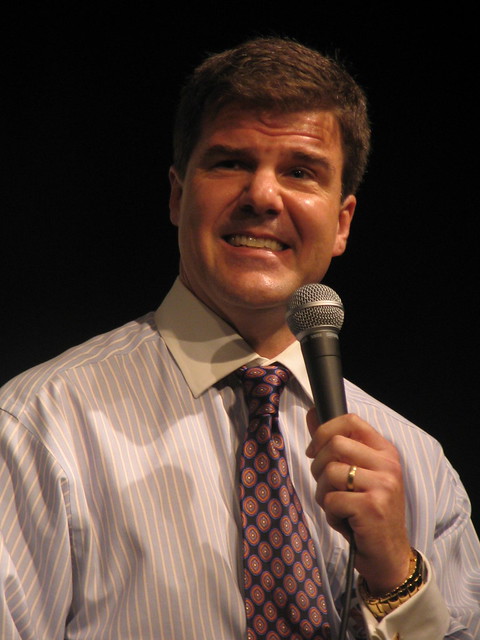 The Mental Illness Happy Hour is a special and extraordinary podcast in which Paul Gilmartin devotes around an hour and a half to meaningful, probing and open discussions with people who are variously friends, listeners and those with simply fascinating pasts. Blessed with the occasional injection of jet black humour and a host so generous, understanding and comforting that it’s virtually sinful, The Mental Illness Happy Hour is out to impress, and impress it does.
The Mental Illness Happy Hour is a special and extraordinary podcast in which Paul Gilmartin devotes around an hour and a half to meaningful, probing and open discussions with people who are variously friends, listeners and those with simply fascinating pasts. Blessed with the occasional injection of jet black humour and a host so generous, understanding and comforting that it’s virtually sinful, The Mental Illness Happy Hour is out to impress, and impress it does.

Mr. Paul Gilmartin
Openness is the core value sat at the heart of the show, and probably it’s greatest strength. This feels like a show built to be personal, to be brimful with truth and depth, rendered stunning through it’s approach to issues usually so far from podcasting. There are moments released in a quasi-confessional manner, these releases of great fears and ideas that suddenly let loose a relief and emotional release that is almost cripplingly wonderful to hear. Whilst it is through and through an adventure through the soul, it is more than picking through the grim, frequently splashed with gallows humour so touching and often unexpected that both Gilmartin and the guest have exaggerated reactions, but reactions that are nonetheless deeply personal and truthful. These tragi-comic moments not only loosen the tension and make those involved all the more sympathetic, but also frequently launch the conversation further down that path in a different way altogether. A joke created as a ludicrous construct suddenly granted the reality of something altogether more believable, whilst also granting a greater perspective on life and the life long difficulty of accepting reality as it is.

Gilmartin missing a putt.
The Mental Illness Happy Hour is also home to one of the most fascinating and rewarding segments on false radio, taking it’s form as the ‘fear-off,’ an almost contest in which Gilmartin and the guest shoot their fears at each another until one of them runs dry. This little segment is one of the most powerful and touching of the show, in that it really emphasises how similar humans are, and how universal the human condition is. Gilmartin’s fears alone are so numerous empathetic and natural that he manages to seem like all things to all people, his normality in this and his ability to transform a fear into an understanding or a discussion naturally makes him a really strong character to lead such a podcast. His problems so heartfelt and close to your own that it makes him seem all the more close to you, so similar to you, that he feels like he’s in the room with you, if not already inside your head. But this is very different than in a normal podcast manner, where you can so often feel like you’re in the next office over from the ‘fun guy,’ or where the audience is almost purposefully ostracised; instead Gilmartin only ever seeks to pull the audience closer and to let you know that ‘you are not alone,’ which is all but the mantra, if not the catchphrase, of the show.

Gilmartin as alter ego Rep. Richard Martin
Gilmartin is also blessed with a seemingly innate ability to cut to the core. To not only slice through the fat, to move through the lies and the falsehoods and traps that so easily make a forest of a garden, but to align this with an incredible level of empathy. It’s not him ignoring the traps, instead he accepts them and uses these to better express his point about society, humans or just his guest. Maybe this is down to his background, his years of therapy or emanates from his duties as host, but it passes on a really powerful drive to the show. Even when he is silent for long periods you can tell he is listening, carefully considering and understanding so as to phrase the ideas in a way so eloquent that make even the most complex issues immediate. This atmosphere of clarity and comfort also enables his guests to talk at great lengths and to meander through the thought-trains in their minds, exactly as a deep conversation with a friend would. Rather than being shunted down a path, they are free to wander within their own heads, before Gilmartin offers something sage, revelatory and sympathetic. This gifts the podcast a certain magic and creativity that only this brand of long-form conversation could promote, breathing life into the stories of people, gorgeously framing the semi-confessional and wonderfully laying out the stories of human lives.
In a scene so filled with shows of a particular brand and set of ideas, to have a podcast this well crafted, this special and this revelatory is more than a joy, it’s a necessity. Paul Gilmartin is an exemplary host, striding the boundaries between director and listener with a fabulous ease that shines him in his very best light. More than a show about mental illness, frailties and innate personal weakness, this is instead a show about humanity, about openness and the search for truth. Quite simply, this show is a must.
p
